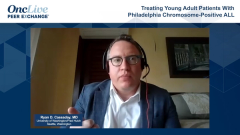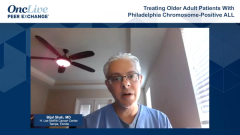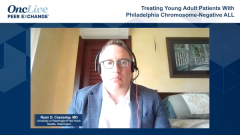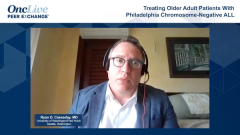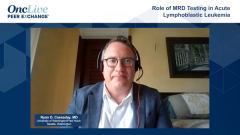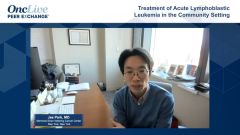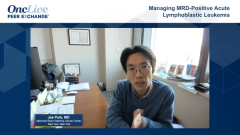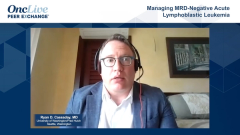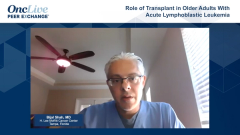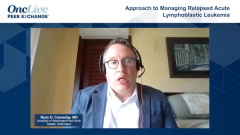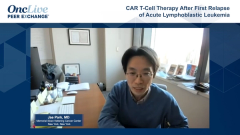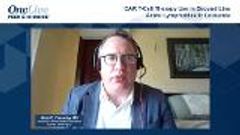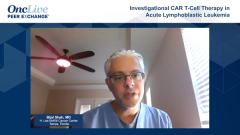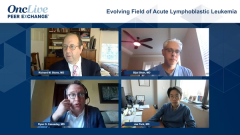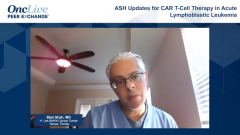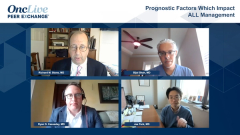
Evolving Field of Acute Lymphoblastic Leukemia
Episodes in this series

Richard M. Stone, MD: Let’s assume that brexucabtagene autoleucel [brexu-cel] is going to be approved. It doesn’t look to me like the approval of tisagenlecleucel is going to change, the approved indication. What do you see the field look like in a year or two?
Ryan D. Cassaday, MD: Brexucabtagene autoleucel will ultimately get FDA approved for adults with ALL [acute lymphoblastic leukemia]. The specific details of the FDA label are going to have to be worked out between the manufacturer and the FDA. For those less familiar with some of these nuances, it’s worth stating that this product is, for all intents and purposes, the same as axicabtagene ciloleucel [axi-cel]. There is a different T-cell selection step that occurs on the back end of the manufacturing phase, but in terms of toxicity, hospitalization for a week, etc, if you’re used to giving axi-cel for large cell lymphoma, it’s more or less the same product. It’s also the product that just got approved for mantle cell lymphoma.
Where I hope the field is going is some attempt at collaboration between some of these different organizations and companies to try to understand, whether it’s through the cooperative group setting or some other mechanism, how we could potentially sequence these therapies in an optimal way. We’re on the cusp of having another potent therapeutic for this historically very challenging disease.
Inevitably what’s going to happen is these are going to creep into earlier lines of therapy as we get more data with mini hyper-CVAD [cyclophosphamide, vincristine, doxorubicin, dexamethasone] and inotuzumab, and as we get the results of ongoing studies from the cooperative groups using blinatumomab as part of the frontline therapy. Inevitably, CAR [chimeric antigen receptor] T-cell therapies are going to continue to move up earlier. How feasible they would be as a truly frontline therapy is debatable, but I suspect that’s where the field is going to be moving in relatively short order.
Richard M. Stone, MD: In a year, if you’re a 35-year-old person with relapsed ALL, whether it’s early relapse or late relapse, will there be more than 1 CAR T-cell product for you?
Ryan D. Cassaday, MD: In a year it will be brexu-cel and only that one, short of investigational strategies. There are many other studies that are ongoing to try to improve upon the gains that have been made so far. At selected centers, as is often the case in modern oncology at particular academic centers, there may be a commercially available product and a clinical trial available that may be preferable, but not yet approved.
Richard M. Stone, MD: Do you think that the approval of brexu-cel will make it more difficult to do research with other CAR T cells like the candidate from Autolus Therapeutics? If you’re 35 years old and you relapse, you’re going to get brexu-cel, you can’t get tisagenlecleucel. That leaves the newer products, like Autolus, which might have less toxicity. Where does that leave that, the third line?
Ryan D. Cassaday, MD: Once we see the full data from the ZUMA-3 study to understand the toxicity profile, the durability of response, etc, there may be subsets of patients for whom we can know up front that there’s a high chance you could have serious toxicity or a low probability of response with brexu-cel. Even though we don’t know how well this third-generation bispecific CAR, that has a new manufacturing process, works, if we gave you the commercial product, your outcome is probably not going to be very good.
Richard M. Stone, MD: The trials will have to be written carefully to allow people to get these investigational drugs earlier because if we wait until they’re near dead, it’s not going to be good.
Bijal Shah, MD: This is the challenge in the field. Most of our protocols exclude prior CAR therapy, independent of the duration of response they had with that prior CAR. That challenges things moving forward because of the concept of clinical equipoise. Do you put a patient on an investigational phase 1/2 clinical trial, even if it has good data behind it, or do you treat them with the commercially approved product where you have a more mature data set?
Richard M. Stone, MD: That’s like the debate between early use of a CAR T cell versus blinatumomab.
Transcript Edited for Clarity


